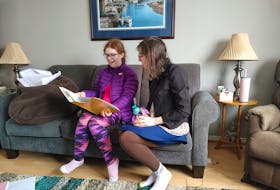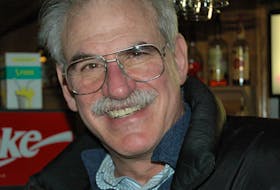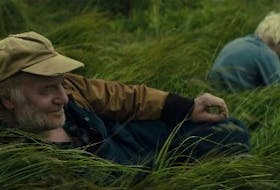
Vanessa Gallant is a model of resiliency. With mental illness and intellectual delay serving as unshakeable hindrances, Gallant seems to have been knocked down more times than all of Mike Tyson's opponents combined. She has lived a life of monumental hardship and abuse. Some blows left her on the mat longer than others, but she always found a way to get back on her feet. Another long companion, the Queens County Residential Services (QCRS), has been Gallant's main stabilizing support for the past 16 years. Gallant, 34, of Charlottetown has leaned on the not-for-profit agency's Community Supports Program time and again to right a rocky boat. "I went through hell,'' she said. "I wouldn't be here (if not for QCRS).'' Gallant was referred to the Queens County Residential Services in June 1993 upon graduation from high school. By this time, she already had a number of jolting experiences, most notably a sexual assault at age 16 that led to nightmares. Gallant's dream was to move to Charlottetown and live in her own apartment. Her future places of residence, however, would constantly change as she struggled with her mental health issues and intellectual delay. The arrangement for her first QCRS placement in a supported apartment in November 1993 broke down after several months despite a case plan that provided for support and guidance through a paid roommate. Gallant, who had had two suicide attempts prior to her referral to QCRS, attempted further self-inflicted harm. She was admitted to the Hillsborough Hospital, where a psychiatrist advised that Gallant not return to the apartment. Gallant chose to access short-term respite at a QCRS group home until another supported arrangement was secured. In May 1994, she moved to a foster family style home where she lived for two years before once again being admitted to the Hillsborough Hospital. This time, she received shock treatments and medication therapy. Upon her discharge in February 1996, Gallant moved to a new supported family room and board arrangement with Amber and Darren Tawil. "This placement proved to be the turning point for Vanessa,'' said Eleanor Ferguson, manager of the Community Supports Program. "Although Vanessa continued to struggle with mental health issues, this placement provided her with the structure, stability and support she required to manage her illness and access disability related services.'' Gallant lived with the Tawils and their growing family for seven years. She continued to receive support from QCRS throughout this time, accessing services within her community. She became a client of Tremploy, a non-profit organization that provides adults who have an intellectual disability with vocational training, life skills training, life enrichment and support services. While she had some success at Tremploy, she was discharged from the service because of her dual diagnosis of intellectual delay and mental illness. Ferguson says the dual diagnosis has been a barrier to many services. Gallant continued to have hospitalizations to address symptoms of depression and psychosis. During this time, she received a diagnosis of bipolar disorder - a mental disorder that is characterized by constantly changing moods. The one consistent factor in Gallant's life over the past 16 years, stresses Ferguson, has been QCRS. Gallant receives vocational training through the property maintenance crew where she is an active participant in providing maintenance support to the six properties owned by QCRS and the a new transitional supported housing complex and life skills training centre being constructed in Charlottetown. "Vanessa has accessed life skills training in areas of money management, household maintenance, community access, nutrition, cooking, grocery shopping, menu planning, personal care, interpersonal/social skills and problem solving,'' said Ferguson. In December 2004, Gallant decided it was time to once again try to live on her own. Through the case management process Gallant, QCRS and the Tawils developed a support plan and Gallant moved into an apartment with her partner Evan Larter. She continued to struggle with bipolar disorder and was hospitalized two more times. But life has been far more manageable of late. Gallant now has more than three years without a psychiatric admission. Consider all she has endured and overcome, Ferguson calls Gallant an inspiration to other young people who must conquer great personal obstacles in order to attain their dream. "She wants to run her own life with minimal support and she's pretty well there and I would like to see that continue on,'' said Ferguson. "We've have had many success stories like Vanessa,'' she added, noting that more than 300 people have gone through the Community Supports Program. Gallant wants to live as independently as possible, holding down a job and managing her mental illness with medication and fortitude. She wants a good life with her common law partner that leaves in the past much of the turmoil that has tormented her for years. She also longs for public acceptance. "Don't judge me,'' she implores. "I'm like anybody else. It's hard out in this world because there are lots of ones who pick on people - and I've been picked on a lot.'' Ferguson marvels at how well Gallant has been able to get up time after time, dust off, and forge on. Gallant has rose up to enjoy real good times only to crash to levels of deep despair. "She was young and tended to get easily caught up with crowds and sought her peer relations through bar scenes and so was often taken advantage of,'' said Ferguson. "She got involved with drugs and alcohol, was sexually exploited, would go missing for days at a time.'' Ferguson says, in the end, she is pleased with the role QCRS has had in helping Gallant soldier on in the face of so much adversity. "With all the detours, whenever she could she got back on the road…she was always willing to accept the support she needed,'' said Ferguson. "She knew what she had to do and when she was well enough to do it, she did it. And here she is.''








